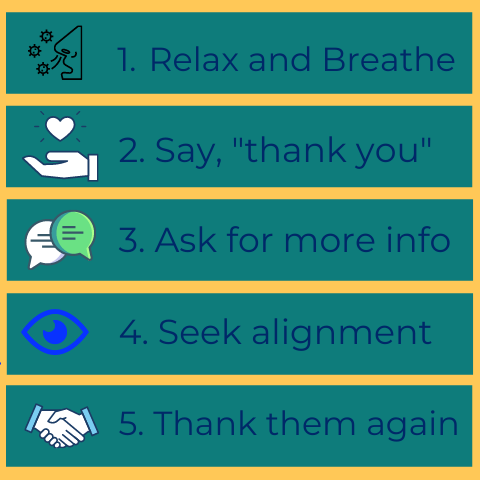Robust Theme
Dec 09, 2019 2020-04-08 7:40Robust Theme
The Gift of Feedback - Part II

By: Kumar Dattatreyan
Imagine for a moment that you're at your desk and you get a phone call from your boss who says, "Hey Kumar, I'd like to share some feedback." What is your first reaction? For me, the reaction is usually quite visceral; I experience a slight pang of fear, a spike in my heart-rate, a rush of adrenaline. My senses are piqued and it's almost like a jolt of pure, raw energy that's awakened me from my thoughts, whatever they may have been.
It doesn't last long, this feeling. Usually just a couple of seconds till I unconsciously will myself to calm down. After a long career of receiving feedback (not all of which was good!), I've gotten quite good at maintaining my composure and appearing calm on the surface even though what I feel, or felt, ever so fleetingly, was panic!
If you're anything like me, you may have felt something similar to that innocuous phrase/question, "Hey [insert name], can I share some feedback?" Why do we feel this way? And what can we do about it?
In my last post, we explored how to give feedback where I shared a simple 5 step method to give someone feedback. The truth though is that it isn't so simple, and that no matter how good one gets at giving feedback, if the recipient isn't ready to receive it, the feedback is probably not going to be of much use. More likely, it'll leave both the giver and receiver frustrated or worse. Feedback is truly a gift, of that I'm sure, however, a large part of the feedback formula rests with the recipient. How can you make yourself more of an equal participant in the feedback discussion?
What I've found over my career as a manager, leader and coach is a simple model that helps me be more a part of the feedback conversation almost instantly. It allows the feedback giver to relax more as they too are stressed and perhaps feeling a bit uneasy about having to give feedback. And, as a recipient, anything you can do to extract the maximum value of the feedback you're getting, the better off you'll be for it.
The model I've used is another simple 5 step method to help the recipient make the most of any feedback they receive:
 :
:
Step 1: Relax and Breathe
This is something I've learned over the years that I put into practice not just when receiving feedback, but also, for most things that may be stressful. Like getting ready for a meeting, or preparing for a coaching session. It's good practice to manage your emotions and calm yourself before potentially high-stress encounters.
You're probably thinking, "well sure Kumar, for those things you have notice and can prepare, but feedback can come without any warning." Very true, however, with practice taking a deep breath, staying calm and relaxing will open yourself to engage and be more present in the conversation. Mindfulness is a very effective technique to help you stay centered, curious and and uncluttered, and when you get good at this, you can summon it on command. So remember, just Relax and Breathe!
2. Say, "Thank You"
Once the feedback giver has shared their feedback, thank them. And I don't mean just giving them a perfunctory thank you, I mean genuinely thank them, even if you don't agree with it, especially if you don't agree with it! By being genuine in your gratitude, it opens the door to a more fruitful dialogue to better understand the context and subtext behind the feedback, which brings us to the next step....
3. Ask for more information
This is your opportunity to ask for more information, for clarity, for context. You may say something like, "thank you for that feedback, can you tell me more about when this happened?" or just a plain and simple, "Thank you, tell me more." Either one demonstrates your curiosity and willingness to hear more about what prompted them to take time out of their day to provide you with this gift. In fact, that's a good way to look at feedback; as a gift worth examining further. Being curious and open will further broaden the scope of your conversation, especially when what's being shared isn't something you agree with. If so, find something to agree with, even if only 2% of what they shared may be the "truth".
You may be thinking, "Well, all fine and good when the person sharing feedback is a peer, but when it's your boss, all this stuff goes out with the garbage!" I can see the point, however, my feeling is that it's even more important to engage in dialogue with your boss when she shares feedback with you. This person holds your future in their hands, and understanding and finding the 2% truth in their feedback becomes even more important.
4. Seek Alignment
Once you have a better understanding of the feedback and how it applies to you, the next step is to align on next steps, if any. If it's your boss, she may expect some actions to come out of the conversation. Take charge of the situation and ask for suggestions, while staying open to coming up with your own.
If it's a peer who's providing feedback, what might you change from the above scenario? Probably nothing, if it was me. I'd still want to align with them on what they think possible actions might be, while staying open and curious about the awareness I've gained from the conversation.
5. Thank them Again!
And finally, once you've reached alignment, thank them again...show them gratitude for taking the time to provide you with this gift of feedback. Remember that feedback conversations can be extremely rewarding and fulfilling...if you let it. It all depends on your mindset and how you show up. So, be present and be curious!
Click below to download the simple steps you see listed here:
Get the guide on Feedback here!

